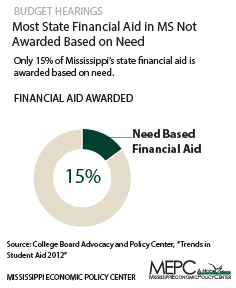Tuesday, both the Institutions of Higher Learning and the Community and Junior Colleges came before the Joint Legislative Budget Committee to discuss funding needs for the next budget year (which starts July 2014).
One common area of discussion was the challenge of meeting the needs of students entering higher education who have financial need, those who need remedial courses, and those who have dropped out of high school. Access to higher education is critical for making sure families are able to earn a wage that allows them to be self-sufficient. During the budget hearing IHL Commissioner Hank Bounds said that the biggest predictor of economic success is educational attainment beyond high school.
Remediation
IHL Commissioner Hank Bounds reported that 24% of entering freshmen at the state’s universities need to take at least one remedial course while presenters for the Community and Junior Colleges Board reported that 52% of entering freshmen at community and junior colleges have to take a remedial course. Remedial education is critically important in Mississippi – and also could benefit from reform. For MEPC’s perspective on how the system could be improved, please see its report “The Road to College Readiness”.
Financial Aid
During the budget committee hearing, both Dr. Bounds and Dr. Eric Clark, Executive Director of the Mississippi Community College Board reported that the cost of attending the institutions within their systems is a critical factor that affects retention and graduation. Many students that drop out of college in Mississippi drop out for financial reasons – even when they are making the grade. Unfortunately, Mississippi dedicates very little of its financial aid towards need based aid. In fact, only 15% of all the state based financial aid is allocated based on need. MEPC has long advocated for dedicating more resources to need based aid within the state. For more information on MEPC’s perspective, see this blog post and this one.
Drop-out Recovery
The Community College Board also asked for $10.7 million in drop-out recovery funds. The drop-out recovery program provides vital opportunities for those who do not complete high school to earn a GED certificate and to continue along a pathway for further higher education or job training. Students who earn a GED earn approximately $385,000 more over their lifetime than someone who never earns a high school degree. For more information on dropout recovery, see MEPC’s dropout recovery fact sheet.







